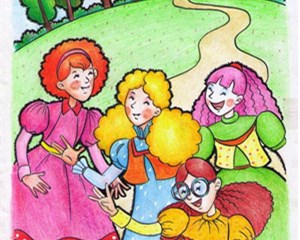(单词翻译:单击)
THE DISTRIBUTION OF PRIZES TO THE WORKINGMEN.
劳动者的奖品授予式
Sunday, 25th.
二十五日,星期日
As we had agreed, we all went together to the Theatre Vittorio Emanuele, to view the distribution of prizes to the workingmen. The theatre was adorned as on the 14th of March, and thronged, but almost wholly with the families of workmen; and the pit was occupied with the male and female pupils of the school of choral singing. These sang a hymn to the soldiers who had died in the Crimea; which was so beautiful that, when it was finished, all rose and clapped and shouted, so that the song had to be repeated from the beginning.
依约,我们大家到公立剧场去看劳动者的奖品授予式。剧场的装饰和三月十四日那天一样。场中差不多都是劳动者的家属,音乐学校的男女生坐在池座里,他们齐唱克里米亚战争的歌。他们唱得真好,唱毕,大家都起立拍手。
And then the prize-winners began immediately to march past the mayor, the prefect, and many others, who presented them with books, savings-bank books, diplomas, and medals. In one corner of the pit I espied the little mason, sitting beside his mother; and in another place there was the head-master; and behind him, the red head of my master of the second grade. The first to defile were the pupils of the evening drawing classes the goldsmiths, engravers, lithographers, and also the carpenters and masons; then those of the commercial school; then those of the Musical Lyceum, among them several girls, workingwomen, all dressed in festal attire, who were saluted with great applause, and who laughed.
随后,各受奖者走到市长和知事面前,领受书籍、贮金折、文凭或是赏牌。“小石匠”傍着母亲坐在池座角进,在那一方,坐着校长先生,我三年级时的先生的红发头露出在校长先生后面。最初出场的是图画科的夜学生,里面有铁匠、雕刻师、石版师、木匠以及石匠。其次是商业学校的学生,再其次是音乐学校的学生,其中有大批的姑娘和劳动者,都穿着华美的衣裳,因被大家喝彩,都笑着。

Last came the pupils of the elementary evening schools, and then it began to be a beautiful sight. They were of all ages, of all trades, and dressed in all sorts of ways, men with gray hair, factory boys, artisans with big black beards. The little ones were at their ease; the men, a little embarrassed. The people clapped the oldest and the youngest, but none of the spectators laughed, as they did at our festival: all faces were attentive and serious. Many of the prize-winners had wives and children in the pit, and there were little children who, when they saw their father pass across the stage, called him by name at the tops of their voices, and signalled to him with their hands, laughing violently.
最后来的是夜间小学校的学生,那光景真是好看,年龄不同,职业不同,衣服也各式各样。有白发的老人,也有工场的徒弟,也有蓄长头发的职工。年纪轻的毫不在意,老的却似乎有些难为情的样子。群众虽拍手欢迎他们,却没有一个人笑的,谁都现着真诚热心的神情。受奖者的妻或子女大多坐在池座里观看。幼儿之中,有的一见到自己的父亲登上舞台,就尽力大声叫唤,笑着招手。
Peasants passed, and porters; they were from the Buoncompagni School. From the Cittadella School there was a bootblack whom my father knew, and the prefect gave him a diploma. After him I saw approaching a man as big as a giant, whom I fancied that I had seen several times before. It was the father of the little mason, who had won the second prize. I remembered when I had seen him in the garret, at the bedside of his sick son, and I immediately sought out his son in the pit. Poor little mason! He was staring at his father with beaming eyes, and, in order to conceal his emotion, he made his hare's face.
农夫过去了,担夫也过去了。我父亲所认识的擦靴匠也登场到知事前来领文凭。其次来了一个巨人样的大人,好像是在什么时候曾经见过的,原来就是那受过二等奖的周。石匠”的父亲。记得我去望“小石匠”的病,上那房顶阁去的时候,他就站在病床旁。我回头去看坐在池座的“小石匠”,见“小石匠”正双目炯炯地注视着父亲,装着兔脸来藏瞒他的欢喜呢。


